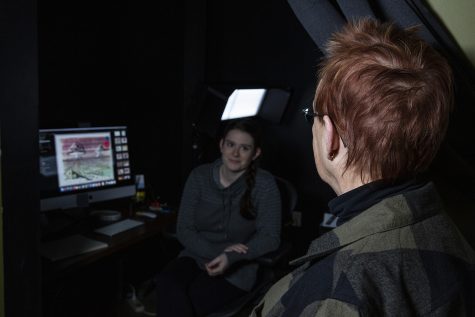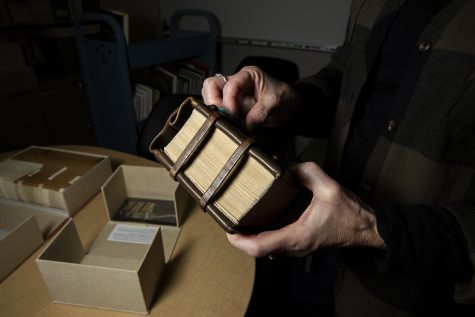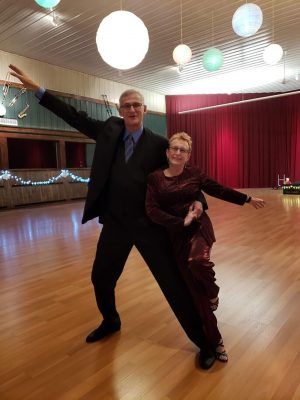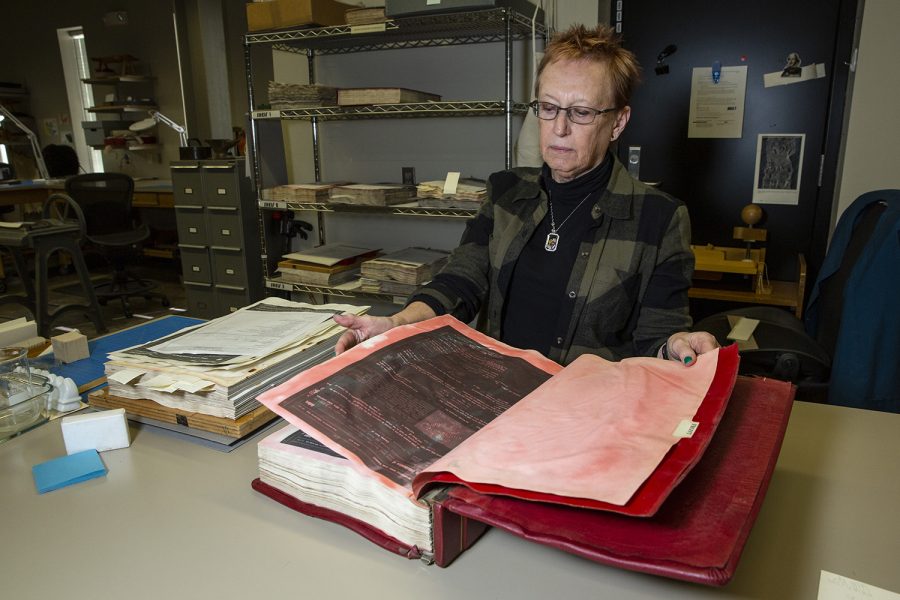Nancy Kraft retires after 18 years at UI dedicating her life to preserving books
After 18 years, University of Iowa Libraries Head of Preservation and Conservation Nancy Kraft has retired to a life of family, friends, and ballroom dancing. Kraft devoted her career to the preservation of books, from natural disasters to mentoring young individuals on maintaining a good read.
Former Head of the Preservation and Conservation Department Nancy Kraft examines a book of documents from the Linn County Registrar affected by the 2008 flood in the middle stage of the preservation process at the University of Iowa Main Library on November 7, 2019. Kraft oversaw the inclusion of new equipment to the preservation and conservation department, including a large digital device used to scan archival documents.
While leading disaster recovery classes on how to save books damaged by floods, Nancy Kraft was anything but dull.
Before class, Kraft would douse antique books from the thrift store with mud for faculty members to clean, and often, she’d hide a plastic snake between the pages to make the exercise just a little more real, and to let participants have a little more fun.
A career of humor, mentorship, and, most of all, books would best describe the Kraft’s 18 years of the head of preservation and conservation at the University of Iowa Libraries. Kraft has devoted her entire life to the preservation of a book and the UI Libraries. Now retired, Kraft is leaving behind her legacy for others to follow.
UI Libraries Conservator Giselle Simón frequently worked with Kraft on various projects involving the libraries, one of them being Kraft’s frequent recovery classes.
Video: Former Head of Preservation and Conservation at the UI Libraries, Nancy Kraft gives a preservation training during her time with the State Historical Society of Iowa
“I asked, ‘What are these for?’” Simón said of the plastic snakes. “She said, ‘To make it more real!’ But really, of course, just to have some fun with it. Everyone would always enjoy finding the snake or the frog in their mud bucket as they learned to salvage books from Nancy’s fake flood.”
Since her start at the UI Libraries in 2001, Kraft has worked as a mentor to serve students and staff on the preservation of books from all over. Kraft has focused primarily on cultural heritage emergency response. She has worked with many distinguished disaster-response teams, including the American Institute for Conservation Collections Emergency Response Team and the State Historical Society of Iowa.

Former Head of the Preservation and Conservation Department Nancy Kraft talks with a former coworker operating the digital scanner at the University of Iowa Main Library on November 7, 2019. Kraft oversaw the inclusion of new equipment to the preservation and conservation department, including a large digital device used to scan archival documents.
She also coordinated disaster response for the African American Museum of Iowa and the National Czech & Slovak Museum & Library in 2008. Since then, Kraft has worked all over the state of Iowa and at the UI to preserve what she loves most: books.
Adapting to a digital era
At the time of Kraft’s entry to her new role with the UI, Kraft said her generation was at a transition with regard to the digital era.
“We came in with computers just starting to be used within the libraries for cataloging,” Kraft said. “We were pretty much still paper, the original artifact oriented.”
By 2003, Kraft said materials were in the beginning stages of being digitized rapidly. She felt as though the profession developed hesitancy in embracing digitization. At that point, there would be no way of preserving a digital image with complete confidence.
“That has really evolved — but that was a huge challenge for my profession,” Kraft said. “We’re digitizing this stuff so that people can have access to it. If it is on a 78 or 16 mm film, or older AV format, there was no way for people to see them. Digital was the only way of providing access. As the world became more adept at digitizing and providing access, there became more pressure.”
Kraft said one of the largest challenges she faced as department head was transitioning her department from the original format to digital.
In order to adapt to the ever-changing world of technology, Kraft brought in a Digital Processing Coordinator Librarian Bethany Davis to work on the demand for more accessibility to library materials online.
Davis had taken on her first professional job under Kraft’s wing. She said having Kraft as a mentor allowed her to fully explore the digital era and take risks within her profession.
“Nancy is an incredible mentor to the people she hires in her department and the colleagues,” Davis said. “With her encouragement, I could do kind of risky things that I could get the freedom and support to excel in these things that I wanted to do.”
Kraft worked to handle AV materials — called eumatic — used prior to VHS tapes. There were many that desired to use these materials, but the machines to view them were so out of date that there was no possibility to use them.
“I felt that I needed a coordinator,” Kraft said. “She ended up working on digitizing paper and photographs to follow current practices.”

Former Head of the Preservation and Conservation Department Nancy Kraft holds one of the books used as a study tool for bookmakers at the university at the University of Iowa Main Library on November 7, 2019. Kraft oversaw the inclusion of new equipment to the preservation and conservation department, including a large digital device used to scan archival documents.
Alongside Davis’ position, Kraft advocated for the need for a larger digitally minded staff within preservation — one of them being the hire of Daniel Johnson, a digital preservation librarian. The hope was for the libraries to be able to use the digital materials for years to come.
“What attracted me so much to the digital era was not only being able to touch the item, but being able to have access to it,” Kraft said.
Preserving the reads destroyed within Iowa’s natural disasters
Kraft arrived at the UI Libraries in the fall of 2001 to address the damage resulting from a fire that engulfed the Old Capitol on Nov. 20, 2001, destroying the cupola, bell, and dome within the building. The fire, smoke, and tons of water that were used to extinguish the flames were left to damage furniture and other items — including the books the libraries contained.
“Some of my staff advised the Old Capitol staff on how to deal with the aftermath of a disaster like that,” Kraft said.
Kraft would continue to provide consultation to the Old Capitol workers to address the aftermath.
Among Kraft’s many projects within her career, Kraft said the 2008 Iowa flood is one she would never forget.
In 2008, Kraft played an active role in the flood preparation and response work. She would also serve to assist the evacuation of the collections in the basement of the of the UI Main Library. The disaster would come as a way for Kraft to advocate for the need to enhance the disaster-recovery technology for the preservation of books.
“I was able to use [the flood] as a reason,” Kraft said. “I had been wanting to form an Iowa response team for disasters and museums — we used that as the backdrop to do a formal group.”
During this time, Kraft also coordinated disaster response for the African American Museum of Iowa and the National Czech and Slovak Museum and Library, working to retrieve the supplies needed for the flood and assisted in decision making.
In response to the 2008 flood and other natural disasters in Iowa that did permanent damage to libraries and museums, Kraft and her team decided to form Iowa Museums, Archives, Libraries, and Emergency Response Team.
The program aims to assess damage to collection materials, make recommendations for collection recovery, assist with decisions on drying out buildings, demonstration of salvage techniques, and/or initial organization of salvage operations, according to the IMALERT website.
Just this spring, Kraft was involved in the aiding of the Southwest Iowa floods. She said her team went to respond to the Union Pacific Railroad Museum that had been under nearly 10 feet of water for six weeks.
“We did what we call a rough cleaning,” Kraft said. “You rinse the bulk of the mud off, but it is not clean. It is just to a point where you can stabilize it until you can go back.”
Kraft said she was always interested in disaster response her whole life but was unsure why or how to navigate through her particular interest.
A life of libraries
The South Dakota native was never aware that there was a preservation field in the library work. It was fairly new to when she began her career. She was only planning to stay with the libraries for a few years, and ultimately had her entire library career in Iowa.
“Part of it was my philosophy to look for my openings,” Kraft said. “During my generation, you could get married, be a secretary — I didn’t want to be a secretary. I didn’t want to be a teacher, and I didn’t just want to stay home. I discovered you could be a librarian.”
Kraft worked as a cataloger for the state of Iowa State Historical Society from June 1981 to December 1984. She said she loved her moment of her time there and had then decided to move on to a different area within her work in the department.
“I had an awareness of protecting an item for the longevity and use,” Kraft said. “[During my time of discovery] there started to be a training in preservation, and I was able to go to workshops. I just like the idea of being able to preserve material so that people could continue to use them for however long something could last.”
In 1993, Kraft took on an opportunity with a team during a time of frequent Iowa flooding. She looked at areas and during the flood and spoke to individuals within the field — sparking her initial interest in preservation.
“I actually worked with the UI Libraries first preservation libraries,” Kraft said. “We decided to work together and put together a flood recovery booklet to be distributed around Iowa.”
‘A library love story’
Kraft’s love story is one for the books.

“I’m married to a librarian. We met at a library conference,” she said with a smile from ear to ear. “We got married in a library. It’s such a library love story.”
She reconnected with her husband during her years at library school.
“He was going part time year round and I was going summers,” Kraft said. “I was working at the University of Dubuque library that had a beautiful glass stained window. So we got married in that library — and the reference librarian was my matron of honor.”
Having established a professional career, Kraft decided that she would keep her name to preserve her and her husband’s professional identities.
Years later, there would be an opening at the UI Libraries for a head of cataloging.
“I went to the person in charge at the time and said, ‘I know someone who would be really good at that, but I’m married to him,’ — and they hired him,” she said.
For around 10 years the couple commuted to the UI and sat two offices down from one another, enjoying every second of their library love.
“We talked work on the way home, and as soon as we got home we stopped talking work,” Kraft said.
A gallery for the UI
On the first floor of the UI Main Library stands the UI Exhibit Gallery — a project pioneered by Kraft in her time with the libraries. Kraft suggests to “take a peek.”
Simón, Independent Contractor Elizabeth Kidera, Director of Collections in the Folger Shakespeare Library Greg Prickman, and Kraft had worked with contractors and consultants to draw up the aspects within the design of the project.
Currently, the libraries use the space to house historical literature and materials of various eras.
Kraft laughed as she explained one of her prized moments of creating the design, choosing the floor plan.
“We had to fight over the floor — they wanted to place tile in the exhibit,” Kraft said. “I said, ‘No, no, no, it needs to be wood,’ ” she said.
Leaving a legacy to protect the book
As she leaves the career in preservation, Nancy hopes to continue the educational aspect of teaching the average citizen how to properly preserve a book.
Early in her career, there were no opportunities to suggest ideas for preservation to folks that were interested in preserving household items, Kraft desired to change that and still continues that same momentum today.
“For example, if someone wants to preserve their family Bible, I have provided a lot of outreach for that,” Kraft said. “To say, ‘If you want to, you can do it at your home, you don’t need to come to a conservation lab — but here is the times when you need to.”
Throughout her career, Kraft has been recognized her work with disaster recovery. In 2009, Kraft received the Midwest Archives Conference Presidents’ Award for extraordinary work following the Iowa flood. In 2018, Kraft would win the 2018 Paul Banks and Carolyn Harris Preservation Award for her leadership and advocacy to preservation education.
She believes it was a service to the world — a world she wanted to see the people around her successful in.
She plans to keep her work with occasionally training others in terms of disaster response and recreating books that have been damaged in natural disasters. However, Kraft is very much ready for a well-deserved retirement full of new faces and places she has never been before, all with the love of her life by her side.
“We’ve got an extended family, we like to travel, and we’re ballroom dancers,” Kraft smiled.

(she/her/hers)
Email: [email protected]
Alexandra Skores is the Managing Editor of The Daily Iowan. She is a senior at the University of Iowa...

(he/him/his)
Email: [email protected]
Ryan Adams is the Films Assistant Visuals Editor at The Daily Iowan. He is a senior at the University of Iowa...


















